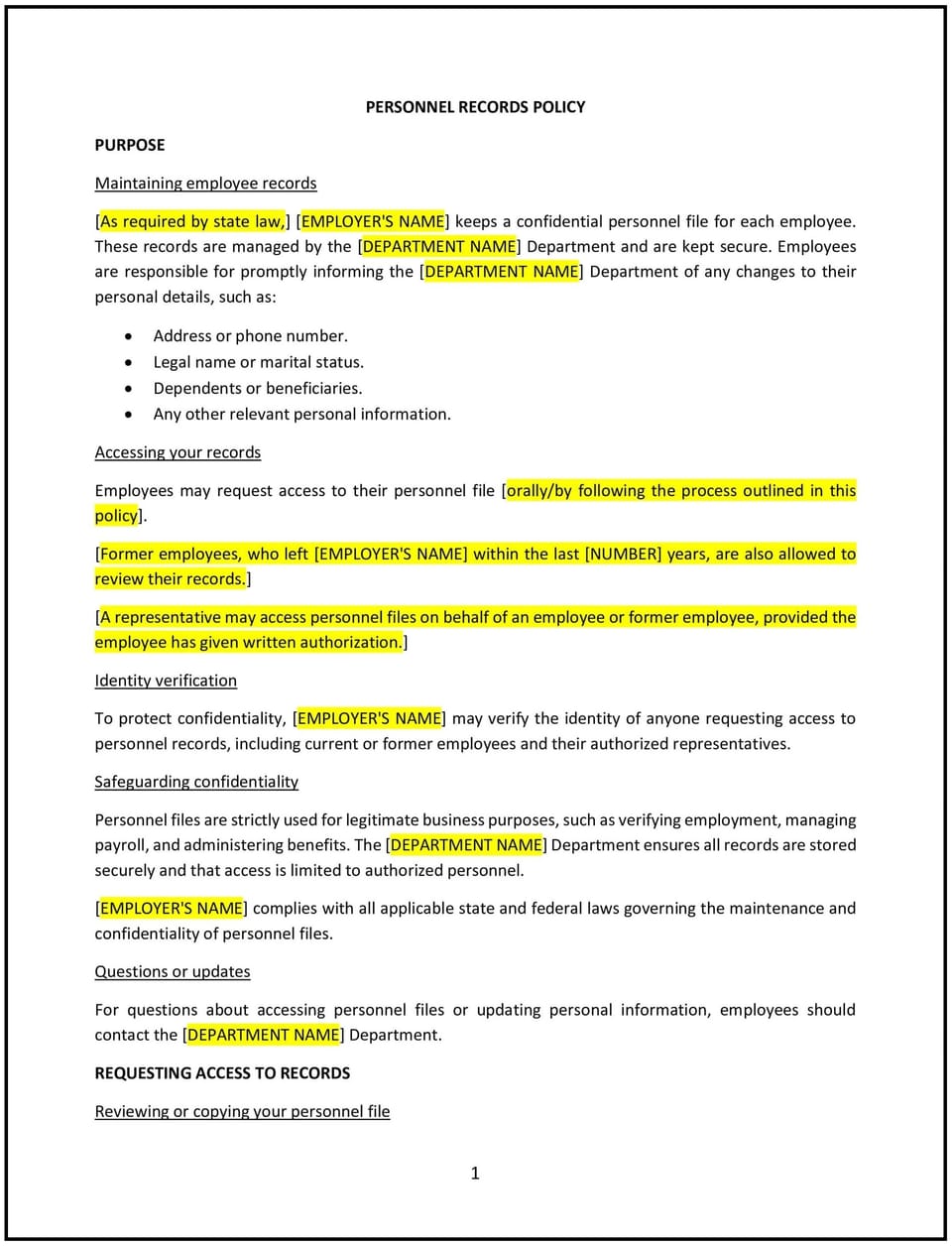Personnel records policy (Delaware): Free template

Personnel records policy (Delaware)
A personnel records policy helps Delaware businesses establish clear guidelines for maintaining, accessing, and protecting employee records. This policy ensures compliance with Delaware and federal laws regarding record retention, confidentiality, and employee rights while promoting transparency and efficient record management.
By implementing this policy, businesses can safeguard sensitive information, streamline recordkeeping, and reduce legal risks.
How to use this personnel records policy (Delaware)
- Define the scope: Specify the types of personnel records covered by the policy, such as employment contracts, performance reviews, payroll information, and disciplinary actions.
- Establish access controls: Restrict access to personnel records to authorized personnel only and implement procedures for employees to request access to their own records.
- Outline record retention periods: Define how long records will be retained in compliance with Delaware and federal laws, such as the Fair Labor Standards Act (FLSA).
- Ensure confidentiality: Emphasize secure storage methods, such as locked files or encrypted digital systems, to protect sensitive employee information.
- Manage updates: Include procedures for updating records to ensure accuracy and relevance.
- Address disposal practices: Detail how outdated or unnecessary records will be securely disposed of to maintain compliance and prevent unauthorized access.
Benefits of using this personnel records policy (Delaware)
This policy offers several benefits for Delaware businesses:
- Ensures compliance: Aligns with Delaware and federal regulations on record retention, employee rights, and data confidentiality.
- Protects sensitive information: Safeguards employee privacy by restricting access and ensuring secure storage of records.
- Promotes transparency: Provides employees with clear guidelines on how their records are managed and accessed.
- Improves efficiency: Streamlines recordkeeping processes, making it easier to maintain accurate and up-to-date records.
- Reduces legal risks: Minimizes the potential for disputes or penalties related to improper record handling or non-compliance.
Tips for using this personnel records policy (Delaware)
- Communicate the policy clearly: Ensure employees understand their rights and the company’s obligations regarding personnel records.
- Train HR personnel: Provide training on secure recordkeeping practices, retention requirements, and legal compliance.
- Use secure systems: Implement digital tools or software to manage personnel records efficiently while ensuring data protection.
- Monitor compliance: Regularly review recordkeeping practices to ensure adherence to the policy and applicable laws.
- Update regularly: Revise the policy as needed to reflect changes in Delaware labor laws, federal regulations, or company practices.
Q: Why is a personnel records policy important for my business?
A: This policy ensures compliance with record retention laws, protects employee information, and promotes transparency in managing personnel records.
Q: What types of records are covered under this policy?
A: The policy typically covers employment contracts, performance reviews, payroll records, disciplinary actions, training certifications, and other relevant employee documents.
Q: Who can access personnel records?
A: Access is limited to authorized personnel, such as HR staff or managers, and employees may request access to their own records following the procedures outlined in the policy.
Q: How should my business securely store personnel records?
A: Use locked physical storage for paper records and encrypted digital systems for electronic records to ensure confidentiality and compliance with privacy laws.
Q: How often should this policy be reviewed?
A: This policy should be reviewed annually or whenever Delaware labor laws or company recordkeeping practices change to ensure continued compliance and effectiveness.
This article contains general legal information and does not contain legal advice. Cobrief is not a law firm or a substitute for an attorney or law firm. The law is complex and changes often. For legal advice, please ask a lawyer.


